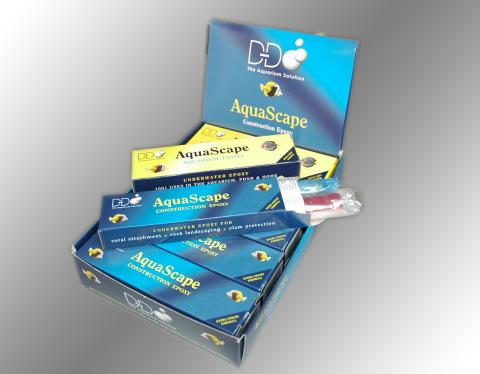Aquascape is a reefsafe, inert construction epoxy that has been used on aquariums and ponds for many years, however we have printed this article to warn against incorrect use:
Each year there are about 30,000+ sticks of Aquascape sold world wide and increasing year on year.
The product is generally inert within the aquarium however each year we get up to half a dozen people around the world who contact us and claim that use of the product has contributed to loss of livestock in their system.
Each time this happens it is a disaster for the customer and which would be understood by any fish keeper and we have great empathy for their situation.
At a ratio of 30,000 to 6 each year I am sure you will agree that this product is reef safe however there are still cases where losses occur and so we have written this to remind you to make sure that you read all of the instructions carefully so as not to become one of the six.
Possible reasons for losses.
In an empty tank there is obviously no risk however in a stocked tank you must look at the following points and take them into consideration.
-
If you strip out an established aquarium to bond the rocks together it is possible that you can disturb anoxic layers under the rocks which can poison the system.
-
Some fish and inverts when stressed such as box fish and sea cucumbers can give off toxins which can kill the other inhabitants.
-
The powdery substance in the putty that can cause cloudiness if over worked is talc. This is inert however if an excessive amount is dispersed in the water then it may possibly further lower the oxygen levels in poorly oxygenated aquariums and cause problems with the fish's breathing.
-
If you disturb or cause a loss of bacteria on your system by removing rocks for any length of time then it is possible to get die back and this may result in a high ammonia spike which will seriously affect your fish and inverts.
How much is too much
When we say do not use excessive quantities we can not really give you a specific level as each system is different. A small system with good skimming and careful use may be less affected than a larger system with no skimming and someone who clouds the water totally.
If the water starts to cloud then stop using the product immediately and wait for any cloudyness to settle. This is only talc but in poorly oxygenated aquariums may lower the oxygen level. Manipulating the epoxy under a tap before use will remove any excess talc.
Remember that less than 0.02% of people suffer any problems at all and of those there is normally a reason such as described above.
We recently had a case where 1 pack was used on a 20 lt aquarium with disasterous consequences however this is the equivalent of 7 sticks on a 4ft x 2ft x 2 ft aquarium.
Generally tanks that have had problems have not been operated with a good skimmer if any at all and have seen over mixing but others are more of a mystery.
Please use this information as a simple warning that even inert products can cause problems if not used correctly.
